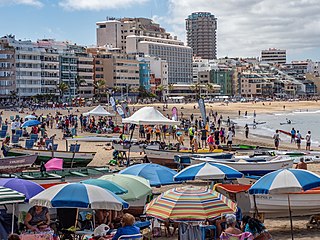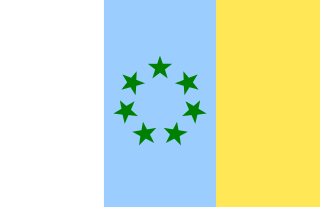
The Canary Islands, also known informally as the Canaries, are a Spanish region, autonomous community and archipelago in the Atlantic Ocean. At their closest point to the African mainland, they are 100 kilometres west of Morocco and the Western Sahara. They are the southernmost of the autonomous communities of Spain. The islands have a population of 2.2 million people and are the most populous special territory of the European Union.

Infanta Cristina is the younger daughter of King Juan Carlos I and his wife, Queen Sofía. She is sixth in the line of succession to the Spanish throne, after her brother King Felipe VI's children, her sister Infanta Elena, Duchess of Lugo, and Elena's children.

Las Palmas, officially Las Palmas de Gran Canaria, is a Spanish city and capital of Gran Canaria, in the Canary Islands, in the Atlantic Ocean.
The National Congress of the Canaries is a separatist political party in the Canary Islands, Spain.
Iraultza was a small Basque militant armed group of leftist tendency, active between 1982 and 1996 as a response to the suppression of the Basque resistance movement. It was thought to be a group of less than 50 people based in Bilbao, largely focused on the destruction of property, particularly those of American multinational corporations and against other smaller Spanish companies involved in labor disputes, in support of Workers' self-management and mobilization, although one of its attacks was responsible for the death of one individual and several for minor injuries of others. According to newspaper El País it was thought to be responsible for over 210 attacks during its existence.

The Movement for the Self-Determination and Independence of the Canary Islands, was an independentist organization and socialist nature, founded in 1964 by Antonio Cubillo, whose objective was the secession of the Canary Islands from Spain. During the 1970s it operated through two terrorist groups: the Guanche Armed Forces (FAG) and the Canarian Armed Detachments (DAC), directly, but unintentionally causing one death. It maintained good relations with other terrorist groups, mainly First of October Anti-Fascist Resistance Groups (GRAPO), who provided it with weapons and explosives, and with socialist Arab governments, such as Libya and Algeria, which provided financing and in Algiers they had a radio station. Also MPAIAC radio programs asked the Canarian people to "return to their roots" and tried to popularize the Berber language.

The Popular Front of the Canary Islands or FREPIC-AWAÑAK is a marginal leftist political party seeking independence from Spain for the Canary Islands.

Canarian nationalism is a political movement that encourages the national consciousness of the Canarian people. The term includes several ideological trends, ranging from a demand for further autonomy within Spain to the right to self-determination.
Antonio de León Cubillo Ferreira was a Spanish Independentist, politician, lawyer and militant from the Canary Islands.

Jerónimo Saavedra Acevedo was a Spanish politician and academic. He served as President of the Canary Islands twice, from 1983 to 1987, and again from 1991 to 1993.

Alternativa Popular Canaria is a Canarian nationalist leftist party founded in 2002, and part of the Movimiento de Liberación Nacional Canario (MLNC). Its creation was spurred by the youth organisation Azarug and several municipal parties, as well as members of various leftist nationalist parties.

Azarug Is a leftist youth organization of the Canary Islands founded in 1992 that seeks the independence of the archipelago.
The assassination of Augusto Unceta Barrenechea was an attack by the Basque separatist group ETA which took place on 8 October 1977 in Guernica in the Basque Country in northern Spain.
Terrorism in Spain has been committed by various groups and people.

The 2007 Canarian regional election was held on Sunday, 27 May 2007, to elect the 7th Parliament of the Autonomous Community of the Canary Islands. All 60 seats in the Parliament were up for election. The election was held simultaneously with regional elections in twelve other autonomous communities and local elections all throughout Spain.
The Alianza Apostólica Anticomunista was a Spanish far-right paramilitary organisation active from 1976 to 1983, primarily in the southern Basque Country but also in the French Basque Country and Barcelona. A June 2010 report by the Office for Victims of Terrorism of the Basque Government attributed eight murders with 66 deathly victims to the group and linked it to the National Police Corps, SECED and the Civil Guard. The group attacked the satirical magazine El Papus in Barcelona, killing one person and injuring 17.
Communist Party of the Canary Islands (provisional) (Spanish: Partido Comunista Canario-provisional, PCC(p)), later Party of the Canarian Revolution (Spanish: Partido de la Revolución Canaria), PRC) was a Marxist-Leninist and Canarian nationalist political party operating in the Canary Islands. The party aim was self-determination for the islands and socialism.

On the afternoon of 17 August 2017, 22-year-old Younes Abouyaaqoub drove a van into pedestrians on La Rambla street in Barcelona, Catalonia, Spain killing 13 people and injuring at least 130 others, one of whom died 10 days later on 27 August. Abouyaaqoub fled the attack on foot, then killed another person in order to steal the victim's car to make his escape.

An eruption at the Cumbre Vieja volcanic ridge, comprising the southern half of the Spanish island of La Palma in the Canary Islands, took place between 19 September and 13 December 2021. It was the first volcanic eruption on the island since the eruption of Teneguía in 1971. At 85 days, it is the longest known and the most damaging volcanic eruption on La Palma since records began. The total damage caused by the volcano amounts up to 843 million euros.
Drago Project is a political party of the Canary Islands created by former Podemos secretary Alberto Rodríguez Rodríguez on 24 October 2022. The party plans to run for the regional elections in Spain in 2023.










